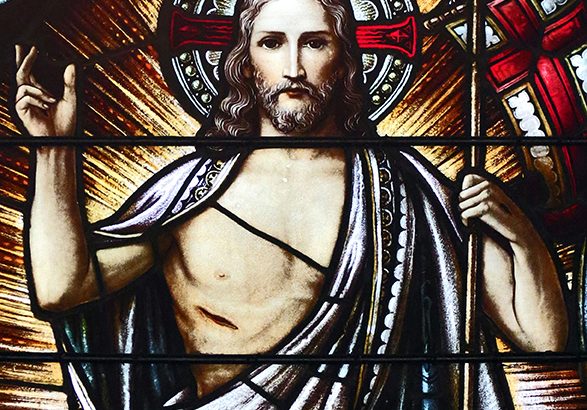As we noted at the start of Lent, the number 40 is usually associated with a period of preparation. Following the 40 days of Lent, there are 40 days of preparation between the Resurrection and Ascension. My very young grand-nephew once asked me a very profound question: “Where was Jesus in the time between his Resurrection and Ascension?” All I could say was that he came back on several occasions to strengthen the faith of the Apostles and to prepare them to take up leadership in the Church. He would not be with them as before when they could see him, hear him and touch him, but he would still be with them in many different ways. “You believe because you can see me. Blessed are those who have not seen and yet believe”.
Closed doors
Today’s Gospel (John 20:19-31) gives us two encounters of the Risen Lord with his disciples. The setting for the first encounter doesn’t look too promising. The disciples were locked in behind closed doors, confused and afraid. Would there be more arrests? There is an old Irish saying that God’s help is nearer than the closed door, and sure enough, Jesus came and stood among them. “Peace be with you,” he said. Like a document of identity, he showed them his wounded hands and side. This is a very significant identification because, as the prophet Isaiah wrote many years previously, “Ours were the sufferings he bore, ours the sorrows he carried. Through his wounds we are healed”. He is the wounded sacrificial Lamb of God who takes away the sins of the world. Then he told them that they were to carry on his ministry of mercy to the sinner. “As the Father sent me, so am I sending you.” But how might they perform this divine work? It would be through the power of the Holy Spirit. One of the psalms described the moment of death thus: “You sent forth your spirit and they are created. You take back your spirit when they die, returning to the dust of the earth.” John’s Gospel describing the death Jesus wrote that he bowed his head and gave up his Spirit. The inspiration of the mission of Jesus would now be passed on to the disciples. The Risen Lord breathed on the disciples saying “Receive the Holy Spirit. For those whose sins you forgive, they are forgiven; for those whose sins you retain, they are retained.” Retaining means calling a sin a sin, and telling people that the mercy which God wishes to bestow on them is being blocked until they humbly and genuinely repent of their wrongdoing. The message for Christians down the ages is to recognise the presence of the Risen Lord in the sacrament of Reconciliation.
Wounds of life
The Apostle Thomas was missing that day. He absolutely refused to believe what the others told him about the Lord’s appearance. He was so loyal to Jesus that he once declared that he was willing to go to Jerusalem with Jesus and die with him. But he was loyal to a fault. Loyalists, as we know, whether political or religious, find it very hard to accept change and often become embittered. Thomas was so loyal to the former days of knowing Jesus physically that he was not ready for the change to know him by faith instead of physical recognition. In his despondency and bitterness, he absolutely refused what the others told him about the Lord’s appearance. “Unless I can see the holes that the nails made in his hands and can put my finger into the holes they made, and unless I can put my hand into his side, I refuse to believe.” Now, there’s bitter stubbornness for you!
When the Lord appeared the following Sunday, he invited Thomas not only to see the wounds, but to touch them. Touching the wounds is very significant because it suggests getting in touch with the wounded parts of our inner self.
The steps in a rehabilitation programme begin with getting in touch with the inner wounds of life. The humble admission of an inner hurt or uncontrolled addiction involves touching the wounded area. Then it is handed over to the higher power. And there is no power higher than the saviour who knows suffering from the inside because he experienced it personally. He achieved the ultimate victory when he conquered death itself by rising from the dead. I have met many people in recovery who hand their lives over to God every day and they have developed a powerful experience of the closeness of God.
Mysterious wisdom
When Pope Francis was a bishop in his native Argentina, he made a point of visiting the very poor families in the shanty towns. There, he met people who had come to know the suffering Christ as one of their own. He found a mysterious wisdom among them. The help of God can come through closed doors.
Prayer
O risen Lord, in the power of the Holy Spirit, call us to come out from behind the closed doors of life.
Touch the wounds of our past failures with the healing power of your wounded hands.
Call us out of the tomb of guilt unto full belief in your divine mercy.
Call us out from the dark cave of fear into believing in your closeness to us.
Call us out from the claustrophobia of anxious fretting into the open air of full trust in your care.
Risen Lord, raise us up into the fulness of life.
Fr Silvester O’Flynn’s book Gospel, Reflections and Prayers is available at Columba Books.


 The risen Christ is depicted in a stained-glass window at St Aloysius Church in Great Neck, New York. Photo: CNS
The risen Christ is depicted in a stained-glass window at St Aloysius Church in Great Neck, New York. Photo: CNS 